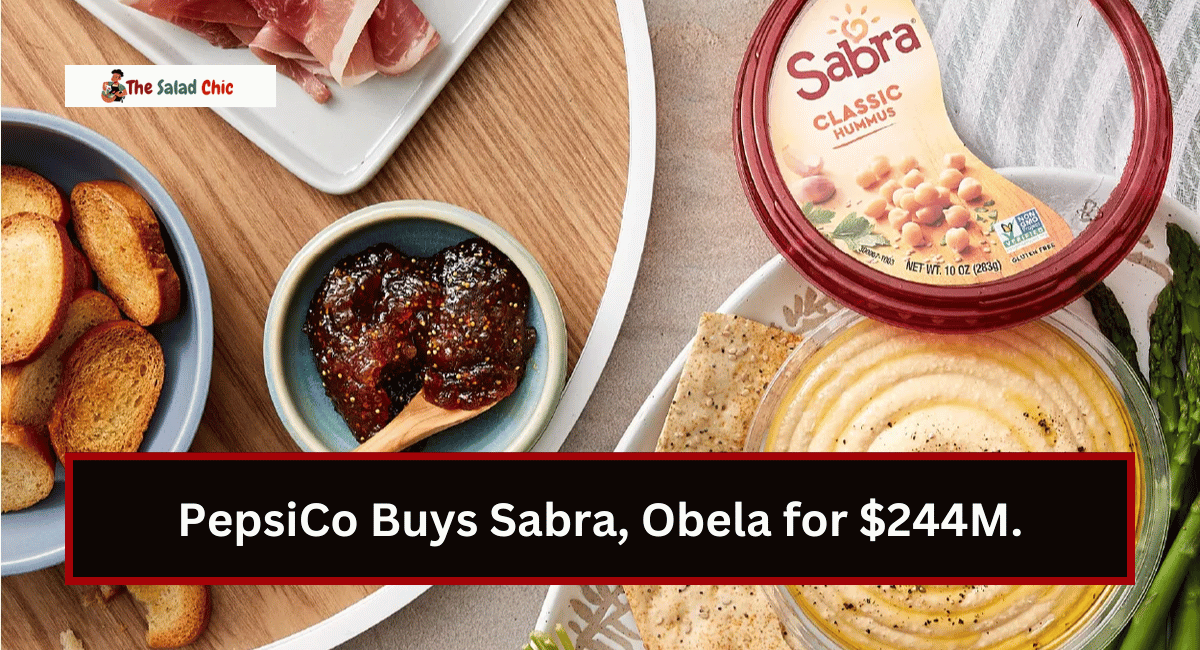PepsiCo is making headlines with its strategic move to acquire the remaining stakes in Sabra and Obela, two famous dip and spread brands. The company is purchasing the shares it doesn’t already own from Israel-based Strauss Group for $244 million.
This acquisition is part of PepsiCo’s ongoing efforts to strengthen its healthier food options and tap into the growing demand for nutritious snacking.
The Details of the Deal
PepsiCo is paying $240.8 million for Sabra and $3 million for Obela, solidifying its brand control. This transaction ends the joint venture that PepsiCo and Strauss began in 2008 for Sabra and later expanded in 2012 with Obela, which serves markets in Australia, New Zealand, and Mexico.
Owning both brands outright gives PepsiCo more control over its innovation, production, and marketing strategies. Sabra is already a significant player in the U.S. market, generating nearly $400 million in retail sales annually.
Why This Acquisition Matters
This move aligns with PepsiCo’s broader strategy to provide consumers with better-for-you food options. As snacking trends shift toward healthier alternatives, brands like Sabra and Obela are well-positioned for growth.
Steven Williams, CEO of PepsiCo Foods North America, stated, “Nutritious, simple foods like refrigerated dips and spreads represent a space we have long desired to expand in the U.S. and Canada.”
A History of Challenges for Sabra
Despite its success, Sabra has faced its share of obstacles. Between 2015 and 2021, the brand grappled with food safety issues, including salmonella and listeria contamination.
In late 2021, the FDA issued a warning letter citing violations at Sabra’s Virginia plant, which impacted production and sales.
Additionally, increased competition and declining market share have posed challenges. Sabra’s market share dropped from over 60% to 37%, prompting Strauss to consider exiting the venture earlier this year. However, with PepsiCo’s resources and vision, the brand has an opportunity to regain its footing.
The Growing Hummus Market
PepsiCo’s acquisition is well-timed, as the hummus market is experiencing significant growth. In North America, the market was valued at $896 million in 2022 and is projected to nearly double, reaching $1.78 billion by 2030, according to Verified Market Research.
To capitalize on this trend, PepsiCo plans to reposition Sabra as more than just a party dip. Executives have outlined a strategy to integrate hummus into daily meals and snacks, making it a staple in consumers’ diets.
With Sabra already recognized by 80% of U.S. consumers, there’s a huge potential to convert casual buyers into regular customers.
PepsiCo’s Health-Focused Snacking Strategy
This isn’t PepsiCo’s first move toward healthier options. The company recently announced its $1.2 billion acquisition of Siete Foods, known for its grain-free tortillas, salsas, and snacks.
Other health-conscious acquisitions include Bare Foods, which makes baked fruit and vegetable snacks, and PopCorners maker BFY Brands.
These deals reflect PepsiCo’s commitment to transforming its snacking portfolio. While it’s famous for indulgent options like Doritos, Fritos, and Cheetos, the company focuses on nutritious, on-the-go foods to meet evolving consumer preferences.
Looking Forward
PepsiCo’s full ownership of Sabra and Obela provides a unique opportunity to innovate and expand these brands. PepsiCo aims to elevate these dips and spreads as everyday essentials by addressing previous challenges and leveraging its vast resources.
With the transactions expected to close by the end of this year, the company is poised to strengthen its position in the better-for-you food market, offering consumers more choices that align with their health-conscious lifestyles.
FAQs
Why did PepsiCo acquire Sabra and Obela?
PepsiCo acquired the remaining stakes in Sabra and Obela to gain complete control over the brands’ innovation, production, and marketing. This move aligns with PepsiCo’s strategy to expand its healthier snacking portfolio.
What challenges has Sabra faced in the past?
Sabra has dealt with food safety issues, including salmonella and listeria recalls, and faced declining market share due to increased competition. PepsiCo aims to address these challenges and rebuild the brand.
How big is the hummus market in North America?
The North American hummus market was valued at $896 million in 2022 and is projected to reach $1.78 billion by 2030, making it a lucrative growth opportunity.
What is PepsiCo’s strategy for Sabra’s growth?
PepsiCo plans to reposition Sabra as an everyday snack or meal component, moving beyond its traditional use as a party dip. The goal is to increase its frequency of use among consumers.
What other health-focused brands has PepsiCo acquired?
PepsiCo has acquired several health-conscious brands, including Siete Foods, Bare Foods, and BFY Brands, to offer better-for-you snacking options.

